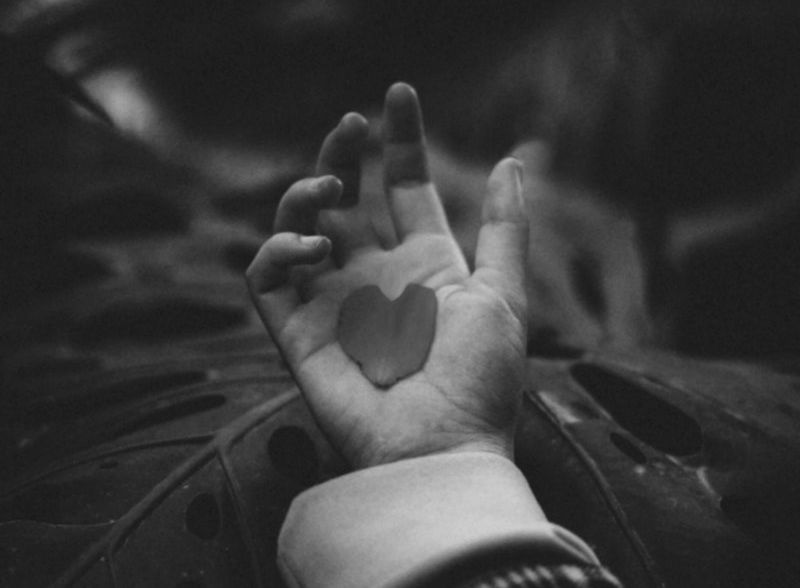At some point or another we’ve all heard these words before:
“Suck it up princess!” “Be a man!” “Stop being a cry-baby,” “Get over it,” “Stop being so sensitive,” “Get thicker skin!”
While these words were likely spoken without consciously intending us long-term harm, they nevertheless point to a common and undeniably tragic truth in our society: that expressing your emotions is a sign of weakness, rather than strength.

Soul Work Compass Course:
Is a vague sense of emptiness lurking beneath the surface? It’s time to reclaim your life. The Soul Work Compass Course helps you break free from self-doubt and repetitive pain. Don’t just survive – thrive by creating a personalized map for your future. Start your journey to profound self-discovery and authentic life direction now.
If you were born into an emotionally repressed culture that valued the “masculine” ideals of efficiency and logic, it is likely that you struggle with some level of emotional numbness.
If you were born into a family that shunned any form of strong emotional expression, it is even more likely that emotional numbing is an issue for you.
And if you experienced an extremely traumatic life event that was simply too overwhelming for you to handle (from which you haven’t recovered), I can almost guarantee that you suffer from emotional numbness.
So how does emotional numbness impact virtually every part of our life? And what advice can I share with you after going through my own struggle with this issue? Keep reading and you’ll find out.
Table of contents
What is Emotional Numbness?

Emotional numbness is a defense mechanism employed by the mind to avoid intense and overwhelming emotions such as fear, hatred, jealousy, and grief. When you go emotionally numb, you lose the ability to feel and experience your emotions on a psychological and emotional level. In this sense, emotional numbness is often clinically connected with dissociation, which is the disconnection from one’s memories, identity, environment, body, or senses.
What Causes Emotional Numbness?

As with most issues, emotional numbness goes back to childhood and the way we were raised by our parents. Being abused by our parents physically, emotionally, sexually, psychologically, or spiritually can contribute towards our inability to self-regulate emotions, which results in emotional numbness. Feeling alienated or disconnected from one or both of our parents, or family at large, can also contribute towards emotional numbness. Being punished whether directly or indirectly for expressing our emotions in childhood also creates emotional numbness.
Numbing our emotions may also start after a severely traumatic experience, such as witnessing acts of violence, being assaulted, experiencing rape, suffering intense loss, or anything that we didn’t have the capacity to psychologically and emotionally handle in the moment. For this reason, emotional numbness is often a symptom of PTSD and various anxiety disorders. You can take our free emotional trauma test to explore this further.
Want to get LonerWolf at the top of your Google search results?
Emotional numbness is also influenced by our culture and wider social circles, particularly those that emphasize being stoic, rational, and emotionally invulnerable (e.g., British, Chinese, American, Russian).
The Danger of Emotional Numbness

If you even have the slightest inkling that you might be emotionally numb, it’s time to listen up. Emotional numbness is not a small character flaw or minor area of self-growth to improve in – it is a serious problem which needs to be addressed immediately.
Speaking from experience, emotional numbness has formed the root of many issues I have faced (and still continue to face) in my life. Due to my upbringing in an emotionally stunted, dogmatically religious family whom I felt disconnected from for the majority of my life, I never learned how to handle strong emotions. I was punished verbally, emotionally or physically anytime I expressed strong emotions, and freethinking or any form of dissent was rejected, resulting in being ostracized.
The combination of having a British father and a mother who was traumatized by her own emotionally unstable mother – on top of an oppressive fundamentalist religion – led to grooming me as a stoic and “stable” person who was taught that expressing emotions was not only bad but shameful.
As you can see, sometimes there are numerous factors at play that may contribute to your inability to regulate intense emotions, and therefore resort to unconsciously numbing them. In my case, I learned that strong emotions = punishment in one form or another, and so I learned that they were dangerous to experience.
The danger of disconnecting from your emotions is that it can lead to a host of mental, emotional, physical, and spiritual issues. Such issues may include dysfunctional coping mechanisms (obsessive compulsions), mild to severe depression, spiritual emptiness, inability to enjoy life, inability to form close and fulfilling relationships, disconnection from inner self, confusion, irritability, fatigue, addictions, chronic illnesses, and somatic illnesses (illnesses produced by the mind).
In extreme cases (and I’m talking about situations where emotional contact is nil), emotional numbness can lead to acts of cruelty.
Why is it ‘the Secret Illness’?
I call emotional numbness the secret illness because it is so pervasive in our society, and so socially acceptable, that it often flies underneath the radar. In a society that largely doesn’t know how to handle strong emotions in healthy ways, being stoic and “level-headed” is valued – yet this very same calm and collected facade often conceals unhealthy detachment from one’s feelings. Thus, emotional numbness is a secret illness because so many of us struggle with it, yet don’t even realize that we have it until chronic issues start emerging.
Download FREE Worksheets!
Go deeper with an emotional numbness journaling prompt + printable meditation mandala!
13 Signs You’re Struggling With Emotional Numbness

Emotional detachment is not always a bad thing. It comes in handy when you need to maintain boundaries, avoid undesired energy overload from others, and even help others in crisis situations. But emotional detachment turns into its unhealthy twin (emotional numbness) when it becomes an automatic inner defense mechanism.
“What’s so great about feeling strong emotions?” you might ask. The answer is that without feeling our emotions, we don’t have the capacity to live and learn from them or experience the beauty and depth of life.
Would you like to save this?
Your information will never be shared.
Here are some of the most significant signs of emotional numbness that you should look out for:
- Inability to express strong negative or positive emotions
- Inability to “fully participate” in life (i.e., feeling like you’re a passive observer)
- Feeling that life is like a dream (a sense unreality)
- Living on autopilot
- Lack of interest in activities others find enjoyable
- Feeling distant from others
- The tendency to withdraw from friends and family members
- Emotions are only felt in the body as sensations, but not by the mind (or else are completely muted in the body and show up only as illness)
- Dislike of people who express strong emotions (both positive and negative)
- Not feeling anything in situations that would usually generate strong emotion
- Panic or terror when strong emotions eventually breakthrough
- Feeling empty inside
- Physical and emotional numbness or “flatness”
In extreme circumstances (such as in PTSD sufferers), emotional numbness may even influence the desire to commit suicide. If you are considering suicide, please seek out support immediately (click here to locate your country’s suicide hotline).
How to Overcome Emotional Numbness

Like any psychological defense mechanism, emotional numbing can be complex to deal with, and often requires support from a trained professional such as a therapist.
If you feel that emotional numbness is significantly impairing your life, please do an act of self-compassion and seek out support either locally or online (there are even free counseling services online such as 7cups).
For the time being, here are some helpful practices which I have personally found to increase my ability to feel, cope with, and express strong emotions:
1. Anchor yourself to your body
As mentioned above, emotional numbing is connected to dissociation (mental disconnection from one part of yourself). In my case, whenever I experience strong emotions, my automatic response is to either (a) only feel the emotions in my body, not my mind, or (b) to have a complete meltdown. In both cases, one of the best self-soothing mechanisms I’ve learned is to anchor myself to my body through mindfulness and physical contact. Similar to what a mother does with her child, I tightly but gently hold one area of my body – usually my hand or stomach. This method helps me to feel contained and grounded in my body.
I also recommend using shapewear or a pressure vest to help you in extremely emotionally turbulent periods to anchor yourself to your body (here is a good example of shapewear). Shapewear is used by women and men to keep “love handles” and other body parts slim and defined. For our purposes, shapewear is like a hug to the body that will help you feel safe and ‘held together.’ Pressure vests are a little more expensive and they are used by people with sensory integration disorders (such as autism) to relax.
2. Deep breathing
Whether used alone or in conjunction with the above-mentioned technique, deep breathing is a simple and easy way to help you mindfully move through whatever you’re experiencing. This practice is particularly useful when intense feelings such as fear or rage break through. There are many books out there that talk about the importance of deep breathing (such as this one), and there are many online tutorials with breathing techniques. I recommend sticking to something simple, something you don’t have to think about too much, and something that doesn’t feel forced. The point of deep breathing isn’t to follow someone else’s technique perfectly, it is to use your breath (in whatever way suits you), to calm your mind and body. Also, I recommend breathing slowly, deeply, and softly instead of forcing deep breaths (which can increase anxiety) – let your breath be natural. Read more about how to relax using deep breathing.
3. Keep a journal of sad thoughts

I realize this suggestion may sound a tad bit melancholic, but it’s a practice worthy of your time and effort, particularly if you’re wanting to feel and express your emotions. Journaling is also a powerful form of shadow work (a way to express what you would usually suppress).
In a physical journal or online diary, spend five to ten minutes every day writing down something which triggers even the slightest pang of sadness in you. For example, you might write down a memory of your dog who died, an issue in the world, something someone said to you, a scene from a movie, a daily struggle … or virtually anything that is upsetting (or what you imagine would be upsetting).
Creating a sad thoughts diary has two main benefits. One, it helps you express your emotions, even if in an indirect way at first. And two, it acts as a catalyst for feeling and letting out your emotions, particularly when you need momentum (I’ll elaborate more on this soon). Learn more about how to journal.
Always try to finish your sad thought journalling with something uplifting, like reading the uplifting news subreddit, spending time with someone you love, playing with a pet, or watching something entertaining on youtube or Netflix.
4. Catharsis (let it all out, baby!)
When emotionally numbing ourselves becomes our default defense mechanism, we tend to have a huge amount of suppressed emotion lying just beneath our conscious awareness. In order to safely and effectively express your suppressed emotions, try some form of catharsis. Catharsis may involve screaming into or punching a pillow, using your sad thoughts journal (mentioned above) to stimulate sadness and crying, intense emotional-fuelled exercise, impassioned dancing, or an active meditation.
Regular catharsis should be a must on your journey. Without regularly ‘letting it all out,’ you run the risk of experiencing the repercussions of festering emotions (i.e., depression, emptiness, chronic illness, etc.).
5. Yoga and self-massage
Yoga is a well-known way of helping to clear and balance your energy. Not only that, but yoga often has a way of releasing emotions stored in the body. I recommend doing slow and gentle forms of yoga such as Hatha yoga for at least ten minutes a day. Remember, the goal isn’t to become some Instagram-perfect yoga star; it is to connect with your body, mind, and heart.
For over 12 years, we've poured our hearts into creating free content on this website. Unlike many platforms, we believe this guidance should be accessible to everyone. If this post empowered you in any way, please consider making a donation to keep us going. Any amount (one-time or ongoing) makes a huge difference.
The truth is that our unexpressed and repressed emotions are often stored within our bodies. I like to think of our bodies as being reflections of our unconscious mind: they are maps that help us to figure out what we are keeping locked away, and what unresolved issues we need to face. In my article about chronic muscle tension, I list the nine types of emotions trapped in different areas of the body. In order to release these emotions, I regularly use something called the ‘Acuball’ to introduce fresh blood flow and energy into these tense areas. I like the Acuball because it gives me a deep tissue massage, while also helping me to stay grounded in my body, relax, and release pent-up stress. (You can get the Acuball here).
6. Creatively express your feelings (or lack thereof)
Write a song, doodle in a journal, paint a picture, create a collage, find some way of expressing what emotion you last felt. If you struggle to feel anything at all, express that artistically. Grab those greys and blacks and turn that damn page into your own work of art. Pay attention to how you feel afterward. Does even the slightest feeling of satisfaction enter you? Journal about these emotions.
7. Take care of your inner child
As it was your child self that likely copped the trauma that caused you to default to emotional numbing, take care of this part of you. Practice inner child work and find ways of comforting and nurturing this vulnerable place within you. You may even like to create empowering affirmations for your inner child to help him or her access emotions. For example, you might repeat to yourself when you are in a difficult circumstance, “It is OK for me to feel,” “It is safe for me to feel sad,” “My anger is valid,” “Being vulnerable is being strong,” and so forth.
8. Dedicate space and time to feeling
In our busy lives, it is very easy to numb and distract ourselves with social media, the TV, shopping, food, social commitments, and other things that constantly cause us to look outside. Looking inside is much harder and requires far more self-discipline, hence why most people don’t do it. If you are serious about overcoming your emotional numbness, you will need to dedicate space and time to all of the activities I have mentioned in this article. If you struggle with self-discipline, I recommend making yourself externally accountable by joining a spiritual meditation group or other practice to help you turn inwards. Please don’t skip this step, it is imperative that you spend time exploring your inner self, and in particular, what you are repressing and why.
Emotional Numbness Q&A

Here are some commonly asked questions about emotional numbness. Hopefully they’ll answer any remaining concerns or thoughts you may have about this topic:
The simple answer is trauma. Usually, emotional detachment (or numbness) can be linked to early childhood experiences such as being abused mentally, emotionally, sexually, or physically. However, not everyone who experiences emotional detachment had tough childhoods. Sometimes, other traumatizing experiences later in life can trigger emotional detachment as a protective mechanism (such as divorce, job loss, rape, illnesses, war, etc.).
Yes, emotional numbness can mask intense feelings of anxiety – it’s the mind’s way of protecting itself from being flooded by overwhelming emotions. Numbness is a primal reaction to fear and is also known as the freeze response. There are three main reactions to anxiety-provoking situations that we have: fight, flight, and freeze.
To fix, or rather regain the ability to feel again, it’s important to be gentle with yourself. Try reconnecting with your body, practicing deep breathing, doing some catharsis, journaling, and creating a safe environment for yourself. Seeking out professional support is usually crucial, as emotional numbness is usually a major sign of a traumatized nervous system. To regulate your nervous system, you need a safe holding environment, which a professional therapist/counselor can provide.
***

I hope this article opens up new possibilities for you – or at least inspires you to take emotional numbness seriously.
I can’t emphasize enough how important it is to face this issue because avoiding it will only prolong your suffering.
If this article has helped you, please let me know. It brings me a sense of satisfaction to know that I am helping someone out there somewhere. Also if you struggle with emotional numbness and have other techniques or tools to recommend not mentioned in this article, please comment below. You never know how far throughout this world your advice can spread. :)
Please note that this article has affiliate links. If you decide to purchase anything we link to, we get a small percentage to help with our work at no extra cost to you. Thanks!
Two paths to inner transformation – here’s how I can help you go deeper:
1. The Soul Work Compass Course: Feeling lost or stuck in repetitive cycles of pain? The Soul Work Compass Course is your guide to reclaiming your true purpose. In this deep yet practical journey, you’ll learn how to heal core wounds and create a tangible "Soul's Compass" to navigate life with clarity. Enroll now and find your True North!
2. The Inner Work Journal Bundle: Ready for deep transformation? This bundle includes three powerful journals – Self-Love, Inner Child, and Shadow Work – with 150+ prompts to heal wounds, integrate your darkness, and experience bone-deep change. Digital & printable. Print unlimited times.

 $3
$3
Question:
Am I emotionally numb if I feel overwhelmed with tears, sadness, and anger when I read articles about how to fix issues I think I may be struggling with like depersonalization, numbness, and depression? Isn’t sadness and anger two emotions that I had experienced therefore denying that I am numb? What about times when I feel hyperactive (usually before bed after watching a show I like) and I am rambling on enthusiastically about a movie of show? Doesn’t that count as an emotion?
hi am struggling with emotionless numbness emptiness. especially my head where it has numbness. it been years it been going on with me. this is not easy for me to write i was reading your story hoping that i will find held from it. been feeling emptiness with no emotion and numbness is very hard
Question:
Is it normal to become emotionally numb to the point of having Anhedonia during Dark Night of the Soul. I did not know what happened, I woke up one day, I’m numb. I continued my meditative practice despite the fact. There is a thought that keeps popping up during meditation – the word “NOTHING.” There was also an occurrence during my meditation – I felt myself being pulled back, my body becoming weightless, and my vision became purple – in my meditative space – all I see is the color purple. It only happened once and I could not replicate that experience again – I could not enter my meditative space anymore, I could not feel relaxed or feel good anymore, even pain or pressure I used to feel during meditation disappeared. I still meditate, though. But now, in much shorter duration as there are no feelings anymore, which are actually my motivation for meditating. I’m actually not feeling anything right now – no frustration whatsoever. But I think I’m doing something wrong. Please enlighten me.
Luna
This has neither helped me nor hurt me, it has confirmed what I already knew, my parents were emotionally numb addicts – religion addicts – “Godaholics” – religious addiction is just as damaging as any other addiction – I have felt emotionally numb most of the time most of my life – on the rare occasions when I break through the numbness there is always nobody I know who can share my emotions or cares – so I got back into the cave. I have felt emotionally alone all my life, longer than I can remember, and have made some kind of crude peace with the expectation that I always will. I have come to feel that I’m forever living in a different (emotional) galaxy from everyone else, that’s just the way it is, the way it will always be, no solutions, it can’t be healed or fixed.
I completely agree with you. I’ve been emotionally numb for more than half of my life, I don’t remember what it felt like to not be. It’s the new “normal” for me, and I fully accept that it will not get fixed. Without it, I don’t know who I am. The only thing that is okay to me about it is that I can make decisions 100% rationally, which is helpful in situations.
Luna, I love all of your and Sol’s articles on this website but this one has to be one of the most important pieces you’ve written. I want to thank you from the bottom of my heart. I’m currently seeing a therapist and this is the number one thing we’re focusing on for my healing. As I understand it, emotional numbness also has a lot to do with us closing off our hearts and so in doing somatic work, we’re targeting the energy surrounding this part which in my case starts beating really fast any moment any feeling is surfacing.
What do you think about healing practices like Reiki when it comes to emotional numbness? Since it’s energetic work, I went once and in the process, my body wasn’t accepting the ‘love’ energy which the healer was offering it, again for the same reason of being afraid to open my heart and feel anything, whether good or bad.
Hi Nadine,
Thank you for your lovely comment, I appreciate your vulnerability.
I’d recommend staying away from energy healing for the time being for the simple reason that it can be too much for some people’s nervous systems. Have you heard of TRE (trauma release exercise)? This might be a better practice for you, along with the somatic counseling you’re currently undergoing.
I hope that helps <3
Thank you for this posting. It took me decades to understand how much Climate Trauma was effecting me…particularly our inability to acknowledge the momentum in which we are trapped. I finally am owning that I have lived in a state of Shock – which became normal. I write about emerging from this now – Waking Up. My intention is to share this story with others – while connecting them to simple actions they can take. Brene Brown, Julia Cameron and Caroline Myss all influenced this message. Also, a woman named Clare Dubois – whose story and mission have helped me ground my inner healing journey to outer action.
I discovered your little blog while writing about my own discovery of emotional numbness. It really is the hidden emotion – something I articulated last week. Life has tried to get me to pay attention to this emotion for years. However, it has taken my commitment to write about the process of Waking Up – that helped me to make this fully conscious.
Thank you. After being discharged from the hospital these articles serve me very well.
I’m so glad to hear that this article has helped you, Devon. Much love <3
Love is unbreakable and it s so important of being with our partner to make your selves better.
This article definitely helps me to understand my experience. Thanks as always for sharing your insights!
I always wondered why I felt this overwhelming hole in my body- i’d watch people cry but I didn’t feel sadness for them. I can’t even feel a connection to my family or my so-called friends- I just learned recently that one of my good friends is leaving. She was crying on the phone as I just stared at her begging myself to cry but yet I didn’t- I felt absolutely nothing. And even when I cry I don’t cry for long, there’s no feeling just this hollowness. Music is my only way of experiencing it, I just want to be normal. I remember this one memory as a kid where I felt the warmness in my chest I felt happy but I don’t feel those feelings anymore. I don’t feel anything anymore how can you fix that.. Can I have some insight please..?
Thank you Lindsay for this testimonial. I (61 year old male) experience exactly what you describe. Many years ago, a friend of mine (yes, I had a friend then, no friends anymore now), emigrated to anither continent. He had a hard time hugging his farewell. And I was totally blank. I had no childhood trauma, but yes in my parental home, emotions were shunned (not repressed mind you, nothing so traumatic). And here I am, fed up after all these years with my seemingly cold heart. What is there beneat the armour? Is there anything at all? I suspect so, I do not believe I am a psychopath. I did once, after learning that a girlfriend I fancied told me she had been raped, cry (not in her presence though). But I did cry selfless tears over her hurt. Once, long ago, that was. After my grandson’s accident, that left him a paraplegic, I broke down once (again when I was alone) and only that one time. So there is something beneath the ice. But only twice in a lifetime? That can’t be good! I have the same cry from the heart as yourself: What is there to be done?